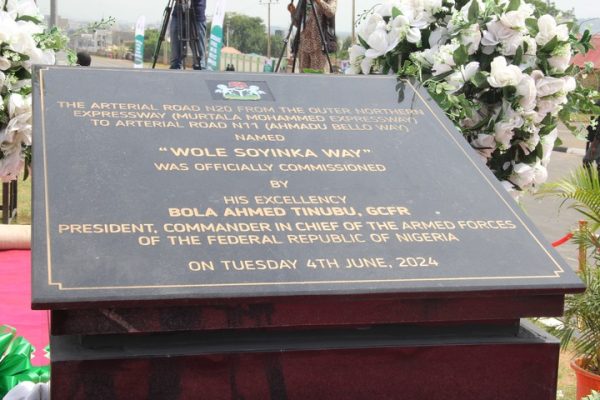Between Murtala Muhammed Way and Wole Soyinka Way
Recently the media was inundated and overheated with a needless protest on a misconceived renaming of an expressway that is named after Murtala Muhammed, with Wole Soyinka who is a globally renowned professor who won the Nobel Prize in Literature, an achievement which made all meaningful Nigerians proud. Murtala Muhammed is the former and late […]

between murtala mohammed way and wole soyinka way
Recently the media was inundated and overheated with a needless protest on a misconceived renaming of an expressway that is named after Murtala Muhammed, with Wole Soyinka who is a globally renowned professor who won the Nobel Prize in Literature, an achievement which made all meaningful Nigerians proud.
Murtala Muhammed is the former and late Head of State and Commander of the Nigerian Armed Forces, in whose tenure the new federal capital was created at Abuja. He set and approved the committee’s recommendation for the relocation of the capital, and created the law that established FCT and the Federal Capital Development Authority (FCDA). Subsequently, Abuja was developed to what we have today. His contribution in the actualisation of the Abuja project is unprecedented and can never be overemphasised.
With due respect to all those who made various comments and observations on the perceived renaming by the FCT Administration, they were made without understanding the narratives. It is necessary to give highlights of the different road hierarchies and their technical terms as they exist and later, the policy guiding the street naming activities in Abuja. This will in no small way assist those who don’t understand the technicalities.
The major feature of the highway system is the expressway network, consisting of freeways and parkway facilities. Within the sectors of the city, a road system, consisting of arterial, collector and local streets provides internal access as well as connections to the expressways. Thus, the highest hierarchy in the city road system is the expressways, followed by the arterials, collectors and local accesses in descending order. Calibres of personalities are considered to match the category of the roads in the street naming exercise.
Another important aspect that needs highlighting is the original planning names of the existing roads in the city, prior to the street naming. The lack of understanding of the technical names also contributed to the controversy. All the expressways, arterials, collectors and local streets have their original planning or technical names. Despite being named after personalities, the FCDA and other FCT technical department staff members continue to use the original names on technical matters for easier references. The online Google Map cannot give you this type of information.
The expressways with 10 lanes are the highest hierarchy. The Outer Northern Expressway (ONEX) is the longest expressway. Others call it Kubwa Expressway. It starts from the AYA where the Trunk A-234 connects with the Federal Capital City, and terminates at the connection with the Trunk A-2 at Zuba. The ONEX is the one named the Murtala Mohammed Expressway. The Ring Road I is named Nnamdi Azikiwe Expressway; it demarcates Phase I and Phase II. It connects to the Murtala Mohammed Way at the Katampe Hill and Outer Southern Expressway (OSEX) at the Apo Roundabout, near Gudu Cemetry. Others are the Inner Southern Expressway S15, named Goodluck Jonathan Expressway. The Northern Parkway N8/N9 is the Sani Abacha Way.
The next hierarchy is the arterial roads. The Ahmadu Bello Way appears to be the longest arterial road in the Phase I. It starts from the northern section of the city and crosses the Central Area District to the southern section. It is technically referred to as the N11 or S11 Arterial, depending on its location either at the North or South. Similarly, Tafawa Balewa Way is Arterial S7, Olusegun Obasanjo Way is Arterial N1, Muhammadu Buhari Way is Arterial S3 and Herbert Macaulay Way is Arterial N5. The other Ways are Alvan Ikoku, Aguyi Ironsi, Obafemi Awolowo, Shehu Shagari, Ibrahim Babangida, Sani Abacha, Ernest Shonekan, Abdulsalami Abubakar, and recently, Bola Ahmed Tinubu.
Above are not the only ones; they were only presented as examples. What we can observe is that all the personalities the expressways and arterials were named after and without exception, are either founding fathers of our nation, past prime ministers, heads of state or presidents. In the Phase I of the city development, not even a past vice president was so recognised, but in the subsequent phases.
The technical name of the street recently named by the FCT Administration as the Wole Soyinka Way is the N-20 Arterial, in the Phase II, and it was clearly stated; not ONEX. The reference to the ONEX was made only when the beginning and end of the road was described. There was nowhere the word replacement featured in the narrative.
Truly, it would have amounted to a monumental disservice, momentous blunder and a bad precedence for any administration in the past, not only the present Tinubu Administration, to even contemplate the replacement of any facility named, not only after Murtala Mohammed, but all the personalities mentioned above, and not only in Abuja, but nationwide, without any credible explanation. In any case, a better alternative must be provided. As it is today, there is no street to be named after Murtala Muhammad as a better alternative to ONEX in Abuja.
